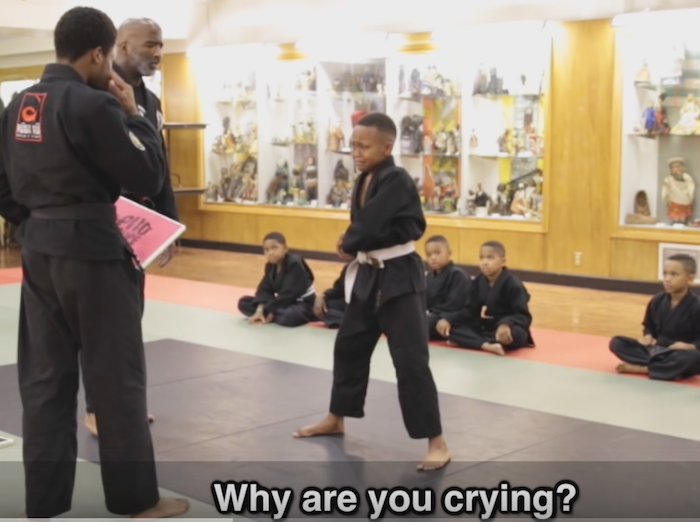Boys don’t cry.
This phrase is more than just the name of a song and album by the English rock band the Cure.
For boys and men in many cultures worldwide, it’s an all too familiar advice.
Elephant Journal writers have previously drawn attention to the shame that is associated with a crying man. Male contributors have written about how they wonder if it is okay for them to share that they cry.
It’s time for us to focus on an antidote to the suffocating effects of societal conditioning that ridicules men for crying.
Here’s what we all should do instead: we should tell boys that it’s okay and normal for them to cry. We should tell them to not listen to those who want them to feel ashamed about expressing their emotions.
Like martial arts instructor Jason Wilson, in a video that has recently gone viral—when his student Bruce, a nine-year old boy, started crying during a martial arts exam because of pain in his hand, Jason did not shut him down. Instead, the instructor assured his student that it’s okay to cry, that he himself cried often, and then proceeded to walk Bruce through his emotions.
At the end, the boy—along with all the other students that watched—probably learned an important life lesson about strength and how to deal with adversity.
Thankfully, there are some highly visible men that show society that it’s okay for boys (and men) to cry.
For instance, U.S. President Obama wrote in his recent Glamour Exclusive about the need to change the attitude that “criticizes our daughters for speaking out and our sons for shedding a tear.” Obama himself has cried in public on different occasions, such as when listening to Aretha Franklin, at the funeral of Civil Rights Leader Dorothy Height, and during his 2016 gun control speech when he spoke about the Sandy Hook massacre.
Obama is not the only male high-level politician who has been seen crying in public. The list of politicians who have publicly shed a tear include men from around the world, such as Russian president Vladimir Putin and Australian Prime Minister Malcolm Turnbull.
However, phrases such as “boys don’t cry” are a sign that as a culture, we are still stuck in outdated gender roles. While we have certainly come a long way when it comes to gender equality, the assumption that women are more passive, and that men are always strong still exists. It expresses itself in phrases such as “boys don’t cry.”
This type of societal conditioning hurts everybody—men and women, let alone people who do not fit into these binary categories. While some of its negative effects receive quite a bit of attention (such as the comparatively small number of women in executive positions), others are not discussed or challenged as frequently.
This includes heavy topics, such as the relative lack of support for male victims of sexual assault. Most implications of these outdated gender roles are thankfully less tragic. They include the observation that men rarely receive compliments about their physical appearance, and that women seldomly propose to men.
Since these effects of societal conditioning keep us in a box and thus prevent us from being our full authentic selves, they are worth pointing out.
As human beings, we have all aspects of human experiences within us—vulnerability as well as strength, receptiveness and proactiveness. In order to explore who we truly are, we need permission to also express the aspects that are stereotypically associated with the opposite gender.
One step towards that is to teach boys that it’s okay and normal for them to cry.
And if we do that, maybe one day “Boys Don’t Cry” will no longer be a behavioral expectation, but only the name of a song.
Relephant:
He was Asking for it: Why We Don’t Talk About Male Sexual Assault.
~
Author: Bere Blissenbach
Image: YouTube Still
Editor: Travis May












Read 1 comment and reply